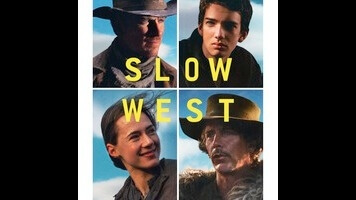About halfway through Slow West, set in 1870, our hero, a Scottish boy named Jay Cavendish (Kodi Smit-McPhee), leaves his campsite late at night to take a leak. After he’s relieved himself, he heads back the wrong way, accidentally stumbling onto another campsite altogether. Fortunately, this group of strangers isn’t hostile. One of them, in fact, proceeds to tell Jay a lengthy, humorous anecdote about a young would-be gunslinger who longed to be infamous enough to merit a “Wanted: Dead Or Alive” poster. This story has unmistakable thematic resonance—much of Slow West is devoted to demythologizing the classic Western, and the misguided lust for glory plays into that. But what it demonstrates most conclusively is that writer-director John Maclean, making his first feature after a career spent mostly as a musician (notably as a member of The Beta Band), knows how to tell a terrific yarn. Why he chose not to do so with the movie as a whole, then, is something of a mystery.
That’s not to say that it’s without interest. After traveling to Colorado in search of his beloved, Rose (Caren Pistorius), Jay, who’s not exactly the rugged type, winds up in the company of a bounty hunter named Silas (Michael Fassbender), who agrees to protect Jay in exchange for most of the younger man’s cash. Unbeknownst to Jay, Rose and her father (Game Of Thrones’ Rory McCann) are the very fugitives Silas is tracking. The $2,000 reward on their heads has also attracted the attention of some old confederates (or perhaps Confederates) of Silas’, most notably a fellow named Payne (Ben Mendelsohn), who’s somehow subtly threatening despite being draped at all times in an animal skin that looks like a lady’s fur coat. Eventually, everyone converges on Rose’s isolated farmhouse, where Maclean stages a prolonged shootout that finally achieves just the right balance between pointed critique and genuine Western action.
Despite its title, Slow West isn’t slow so much as it’s in no particular hurry. Maclean offers numerous digressions—some of them funny (like the seemingly random campsite anecdote above), others verging on didactic (as when Jay encounters an anthropologist with clunkily modern views concerning Native Americans). Smit-McPhee struggles with his Scottish accent, Fassbender struggles to find a character worthy of his talent, and Mendelsohn struggles not to let his wardrobe constantly upstage his dialogue. The film meanders. Maclean has something worthwhile to say about the true brutality of the old West, especially as it relates to immigration, but he hasn’t quite found a compelling context for those musings, and he sprays ideas like buckshot. The movie is one long amble that abruptly springs to life at the climax, featuring a protagonist whose quest only becomes interesting at the moment that it’s finally revealed to be pointless. “In a short time,” the anthropologist tells Jay of their place in history, “this will be a long time ago.” A more succinct description of Slow West, with its odd paradoxes, would be difficult to imagine.








































